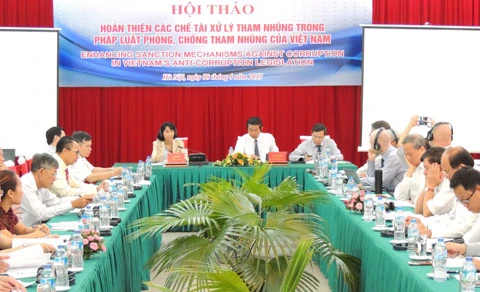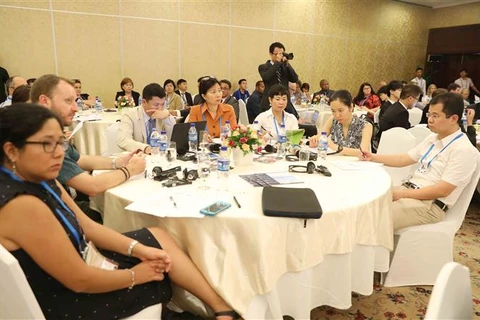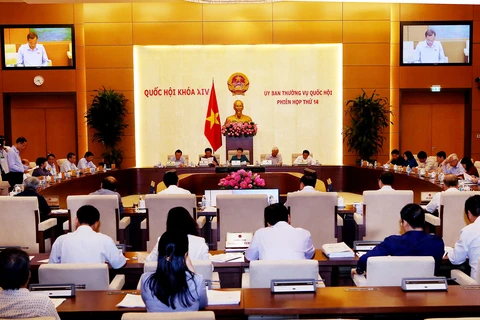Hanoi (VNA) – Revoking assets gained through corruption is one of the most important measures to deal with the consequences of corruption, said Vo Van Dung, deputy head of the Party Central Committee’s Internal Affairs Commission.
He said at a workshop on asset recovery in Vietnam’s anti-corruption legislation in Hanoi on September 21 that guidelines and policies of the Party and State centre on reclaiming ill-gotten assets.
Vietnam has made great efforts to complete mechanisms and implement anti-corruption activities while enhancing international cooperation in this field, he noted.
However, Dung said, results remain poor due to various difficulties in the work.
Caitlin Wiesen-Antin, Country Director of the UN Development Programme (UNDP) in Vietnam, pointed out that unclear legal regulations and a lack of effective coordination between agencies are major obstacles to corrupt asset withdrawal in Vietnam.
The UNDP has assisted Vietnam in anti-corruption over the years, she said, adding that the programme has coordinated with Vietnamese agencies like the Internal Affairs Commission, the Ministry of Public Security and the Government Inspectorate in this regard.
The programme has provided support and policy consultancy for the country, especially in implementing the UN convention on anti-corruption, she said.
Wiesen noted that the workshop is one of the UNDP’s supportive programmes for Vietnam in corruption combat.
Assoc. Prof. Dr. Tran Van Do, former Deputy Chief Judge of the Supreme People’s Court, noted the limited number of handled corruption cases, with only 38.3 percent of corrupt assets revoked in 2016.
He held that the legal system remains inadequate, taking the Penal Code as an example, which, he said, does not prescribe “hidden” corrupt acts like getting rich illegally and receiving expensive gifts.
Echoing Do’s views, Nguyen Dinh Quyen, Director of the National Assembly’s Legislative Research Institute, said that incomplete legal institutions have hindered anti-corruption efforts.
Given this, they underlined the need to devise mechanisms to control the assets and incomes of officials.-VNA
He said at a workshop on asset recovery in Vietnam’s anti-corruption legislation in Hanoi on September 21 that guidelines and policies of the Party and State centre on reclaiming ill-gotten assets.
Vietnam has made great efforts to complete mechanisms and implement anti-corruption activities while enhancing international cooperation in this field, he noted.
However, Dung said, results remain poor due to various difficulties in the work.
Caitlin Wiesen-Antin, Country Director of the UN Development Programme (UNDP) in Vietnam, pointed out that unclear legal regulations and a lack of effective coordination between agencies are major obstacles to corrupt asset withdrawal in Vietnam.
The UNDP has assisted Vietnam in anti-corruption over the years, she said, adding that the programme has coordinated with Vietnamese agencies like the Internal Affairs Commission, the Ministry of Public Security and the Government Inspectorate in this regard.
The programme has provided support and policy consultancy for the country, especially in implementing the UN convention on anti-corruption, she said.
Wiesen noted that the workshop is one of the UNDP’s supportive programmes for Vietnam in corruption combat.
Assoc. Prof. Dr. Tran Van Do, former Deputy Chief Judge of the Supreme People’s Court, noted the limited number of handled corruption cases, with only 38.3 percent of corrupt assets revoked in 2016.
He held that the legal system remains inadequate, taking the Penal Code as an example, which, he said, does not prescribe “hidden” corrupt acts like getting rich illegally and receiving expensive gifts.
Echoing Do’s views, Nguyen Dinh Quyen, Director of the National Assembly’s Legislative Research Institute, said that incomplete legal institutions have hindered anti-corruption efforts.
Given this, they underlined the need to devise mechanisms to control the assets and incomes of officials.-VNA
VNA
























